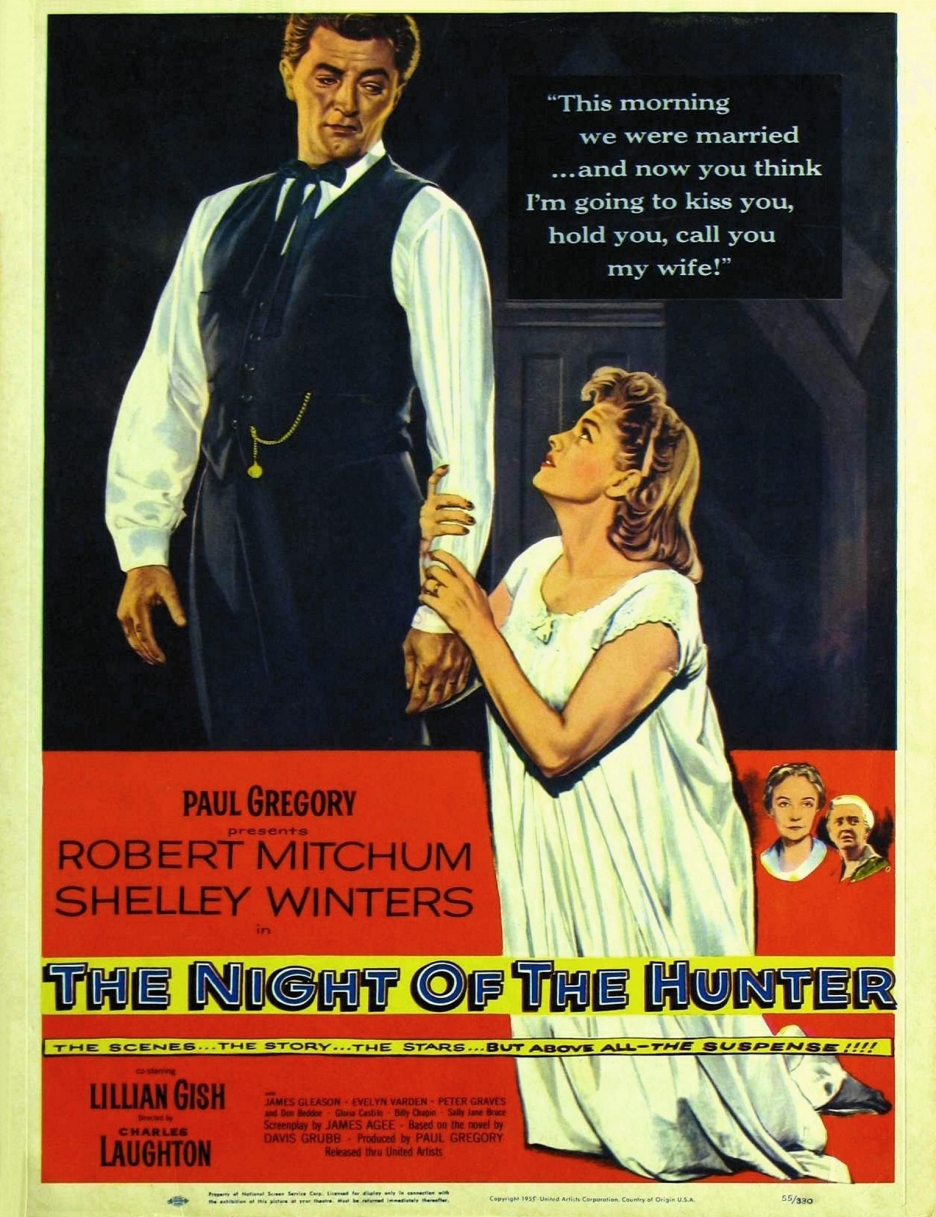jason stives debuts First Picture Show, his weekly column that takes us to the movies …

In a time when the noise in the film speaks louder (no pun intended) than the content of the film, it’s important to reflect on where movies have been and where current trends get their swag from. For those who didn’t study cinema during college, this column serves as a companion piece to your movie-viewing experience — a voice that sits on your shoulder as a casual viewer but also knowledgeable of things that go beyond just what’s on the screen and more of what goes bump in the night when a movie script hits the ground running. The films discussed in this weekly column serve to guide in your first viewing in the same way it was used for my first time …
NIGHT OF THE HUNTER (1955)
Directed by: Charles Laughton
Written and Adapted by: James Agee
Starring: Robert Mitchum, Shelly Winters, Peter Graves and Lillian Gish
Premise: Based on a novel written two years earlier by Davis Grubb, Night Of The Hunter tells the tale of Harry Powell, a serial killer and self appointed preacher who through act of final rights to a convicted bank robber named Ben Harper (Peter Graves) courts and eventually marries his widow (Shelly Winters). What Powell knows is that Harper hid the $10,000 he robbed away — but where, he does not know. He somehow knows that the answer lies in Ben’s son John, the only person to know of the whereabouts of the coveted loot.
What’s Been Said: “It is one of the most frightening of movies, with one of the most unforgettable of villains, and on both of those scores it holds up … well after four decades.” — Roger Ebert
The First Personal Viewing: For me, this is where I really started to appreciate a broad range of movies. While I had watched my fair share of films, Night Of The Hunter was easily a transition of night and day, an occasion where suddenly the context was just as important as the visual presentation. For a lack of miscategorization, Hunter is not a thriller; it’s practically a horror film. The clashing of ideals within the character structures is felt, and the actors shell out some disturbing performances.
Knowing that this was sadly Charles Laughton’s only directorial effort makes me wonder what further films he could have made. The production history shows a heavy involvement on Laughton’s part, and at almost 60 years old at the time of the film’s release, the detail and precision that he delivered is uncanny. The film’s black-and-white presentation combines a theatrical style almost of fantasy-like proportions, with old-school storytelling of good versus evil.

Presentation aside, much of the film’s glory and horror-like elements lie in the beady, scolding eyes of Preacher Harry Powell, played wonderfully by the always enigmatic and raw Robert Mitchum. For me, this was my introduction to Mitchum’s wonderful filmography. Known for being rough around the edges both on a professional and personal level, Mitchum has always been an outside-the-box kind of persona, hindering somewhere between playing traditionalist good guys and bad guys, and ones that are more based in reality. Because of the inflection that the ’50s has on the characters, Powell is more real than he is fantasy but still stands in black against a backlight in the dark figure he represents.
Powell is practically carved into each scene as a characterization clearly for the 1950s. The turbulent time period surrounding Hunter‘s production makes Preacher Powell perfect for the idealized society of American citizens: an image representing a traditional and stoic figure but with the harsh reality of humanity’s corrupt nature. Mitchum delivers lines in the most convincing manner. Whatever cruel and calculating brandishing Powell has from his appearance, he can make a believer of his ways through deception and a phony faith in the poor people of the town he strolls into one evening. This is very obvious in one of the film’s most famous scenes, when Powell explains to Willa and her family in an ice cream shop the story of old left hand versus right hand.
[youtube http://www.youtube.com/watch?v=X20XIg38GcE&w=480&h=390]
Much praise also goes to Shelly Winters for her portrayal of Willa Harper, a woman so desperate to stay married and taken care of she is blindsided by Powell’s fake visage that greatly corrupts and ultimately destroys her faith. It’s quite interesting to see in some aspects how Winters plays Willa here is similar to how she would play a similar role as Charlotte Humbert in Stanley Kubrick’s adaptation of Lolita. Both Charlotte and Willa have very similar characteristics: both widows, have a longing for a place with someone, and self-destructive path that intersects at their faith in the idea of marriage and religion.
Both characters exhibit an almost unholy union, with one clearly in control and the other clearly aware of who is in control. Powell is a domineering figure both on title and male stature, and Willa is prone to stay satisfied with those aspects to keep her life and expectations fulfilled. To really get an idea of the creepy, ritualistic interactions between both Powell and Harper, the infamous bedroom murder scene below shows the true terror of evil and religion and love and hate. Probably one of the most chilling scenes in the entire film but a great representation of this films appeal and importance
[youtube http://www.youtube.com/watch?v=CLVnsznG3DU&w=480&h=390]
While not a commercial or critical success upon release in 1955, Night Of The Hunter even then stood out as a one-of-a-kind film, a marriage of various genres and styles that no writer or director can possible replicate — just adore as a gem.



Very, very good. Its been awhile since I saw the movie but you captured it right on the money.